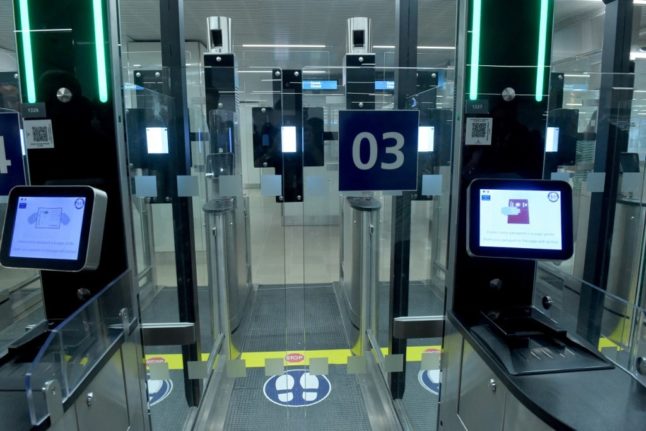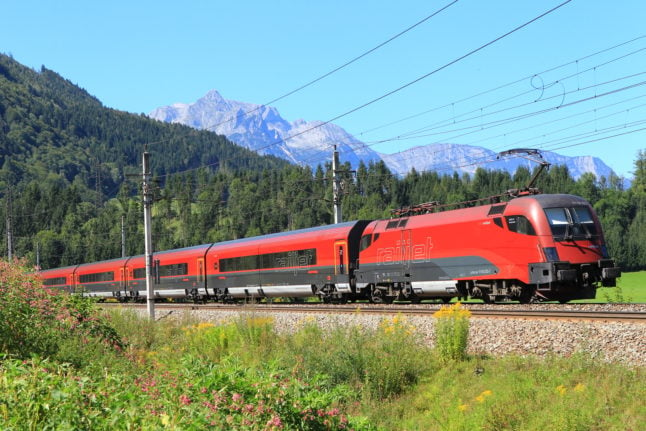Schengen countries are tightening up security at the external borders with the introduction of a new digital system (EES) to record the entry and exit of non-EU citizens in May 2023.
The EES will enable the automatic scanning of passports replacing manual stamping by border guards. It will register the person’s name, type of the travel document, biometric data (fingerprints and facial images) and the date and place of entry and exit. The data will be kept in a centralised database on a rolling three-year basis that is re-set at each entry.
What the EES is intended to do is increase border security, including the enforcement of the 90-day short-stay limit for tourists and visitors. EU citizens and third-country nationals who reside in a country of the Schengen area will not be subject to such checks.
READ ALSO: Foreigners living in EU not covered by new EES border checks
But given its scale, the entry into operation of the system has been raising concerns on many fronts, including the readiness of the physical and digital infrastructure, and the time required for border checks, which could subsequently cause massive queues at borders.
A document on the state of preparations was distributed last week by the secretariat of the EU Council (the EU institution representing member states) and published by Statewatch, a non-profit organisation that monitors civil liberties.
The paper contains the responses from 21 member states to a questionnaire about potential impacts on passenger flows, the infrastructure put in place and the possibility of a gradual introduction of the new system over a number of months.
This is what certain the countries have responded. Responses from Denmark, Spain and Sweden do not appear in the report but the answers from other countries will be relevant for readers in those countries.
READ ALSO: What the EU’s new EES border check system means for travel
‘Double processing time’
Austria and Germany are the most vocal in warning that passport processing times will increase when the EES will become operational.
“The additional tasks resulting from the EES regulation will lead to a sharp increase in process times”, which are expected to “double compared to the current situation,” Austrian authorities say. “This will also affect the waiting times at border crossing points (in Austria, the six international airports),” the document continues.
“Furthermore, border control will become more complicated since in addition to the distinction between visa-exempt and visa-required persons, we will also have to differentiate between EES-required and EES-exempt TCN [third country nationals], as well as between registered and unregistered TCN in EES,” Austrian officials note.
Based on an analysis of passenger traffic carried out with the aviation industry, German authorities estimate that checking times will “increase significantly”.
France expects to be ready for the introduction of the EES “in terms of passenger routes, training and national systems,” but admits that “fluidity remains a concern” and “discussions are continuing… to make progress on this point”.
Italy is also “adapting the border operational processes… in order to contain the increased process time and ensure both safety and security”.
“Despite many arguments for the introduction of automated border control systems based on the need for efficiency, the document makes clear that the EES will substantially increase border crossing times,” Statewatch argues.
‘Stable service unlikely by May 2023’
The border infrastructure is also being adapted for collecting and recording the data, with several countries planning for automated checks. So what will change in practice?
Austria intends to install self-service kiosks at the airports of Vienna and Salzburg “in the course of 2023”. Later these will be linked to existing e-gates enabling a “fully automated border crossing”. Austrian authorities also explain that airport operators are seeking to provide more space for kiosks and queues, but works will not be completed before the system is operational.
Germany also plans to install self-service kiosks at the airports to “pre-capture” biometric data before border checks. But given the little time for testing the full process, German authorities say “a stable working EES system seems to be unlikely in May 2023.”
France will set up self-service kiosks in airports, where third-country nationals can pre-register their biometric data and personal information before being directed to the booth for verification with the border guard. The same approach will be adopted for visitors arriving by bus, while tablet devices such as iPads will be used for the registration of car passengers at land and sea borders.
Italy is increasing the “equipment of automated gates in all the main airport” and plans to install, at least in the first EES phase, about 600 self-service kiosks at the airports of Rome Fiumicino, Milan Malpensa, Venice and in those with “significant volumes of extra-Schengen traffic,” such as Bergamo, Naples, Bologna and Turin.
Switzerland, which is not an EU member but is part of the Schengen area, is also installing self-service kiosks to facilitate the collection of data. Norway, instead, will have “automated camera solutions operated by the border guards”, but will consider self-service options only after the EES is in operation.
Gradual introduction?
One of the possibilities still in consideration is the gradual introduction of the new system. The European Commission has proposed a ‘progressive approach’ that would allow the creation of “incomplete” passenger files for 9 months following the EES entry into operation, and continuing passport stamping for 3 months.
According to the responses, Italy is the only country favourable to this option. For Austria and France this “could result in more confusion for border guards and travellers”. French officials also argue that a lack of biometric data will “present a risk for the security of the Schengen area”.
France suggested to mitigate with “flexibility” the EES impacts in the first months of its entry into service. In particular, France calls for the possibility to not create EES files for third-country nationals who entered the Schengen area before the system becomes operational, leaving this task to when they return later.
This would “significantly ease the pressure” on border guards “during the first three months after entry into service,” French authorities said.



 Please whitelist us to continue reading.
Please whitelist us to continue reading.
This will definitely cause delays for those of us who travel on official/military passports.